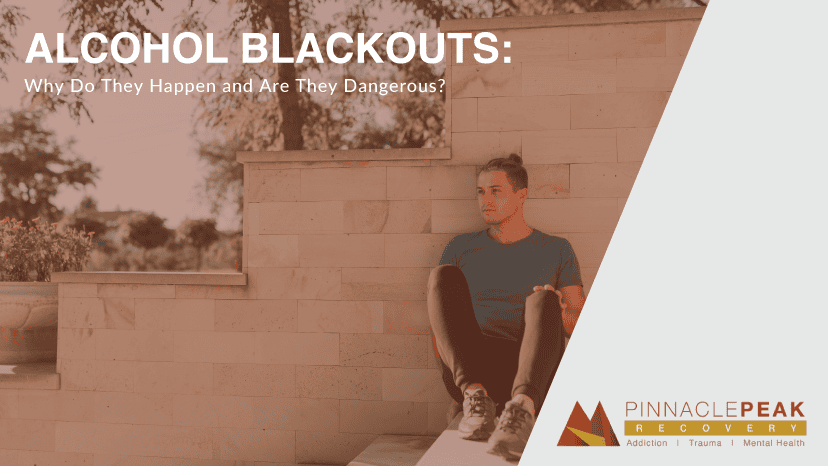Have you ever seen those videos where parents or siblings record someone who has just gotten their wisdom teeth out? They often say hilarious statements from flirting with dental assistants to crying about something totally random. These people don’t remember the conversations taking place, but can usually find humor in them.
A very similar experience is possible with heavy alcohol use. Waking up the next day wondering how you got home or who you were with is terrifying, and not being able to recall anything can be anxiety-inducing and overwhelming.
The truth of the matter is, alcohol blackouts are more common than you think. They can cause you to make reckless decisions without even realizing it. In 2022 alone, over 240 felony DUI arrests took place in Pinal County, which was a 75% increase from the previous year. How many of these people were experiencing a blackout, not even aware they were behind the wheel?
Here at Pinnacle Peak Recovery, we have seen situations like this all too often. Our goal is to provide education and resources for those living with an alcohol use disorder or experiencing blackouts. Let’s take a look further at what an alcohol blackout is and how you can prevent it.
What Is an Alcohol Blackout?
Alcohol is a well-known depressant, slowing the body and mind down while creating feelings of relaxation. However, when too much alcohol is consumed, it can lead to a blackout. Blackouts occur when the brain is no longer converting memories to storage. It is not the same as passing out, the person is still conscious and functioning, but they will have little to no recollection of the events taking place during an alcohol blackout.
What Happens During a Blackout?
During a blackout from alcohol, the person is no longer creating tangible memories. This typically occurs when blood alcohol content – or BAC – rises above .16. Blackouts mainly occur in those who are binge drinking or drinking heavily. As BAC rises, the brain no longer is able to function properly. Systems like memory, coordination, and speech are mostly affected. Besides forgetting events, the person may stumble, slur their speech, and have a difficult time forming thoughts.

The Brain and Blacking Out – What Happens to the Mind?
The area affected most by alcohol is the hippocampus region of the brain. The hippocampus is responsible for converting short-term memories to storage, and when alcohol is consumed, this process is interrupted. As we mentioned above, the person is still awake and functioning even though they are impaired. Thoughts and actions may still be original, but the brain is not in control of moving them to permanent memories.
Effects of Alcohol on Memory
Once the hippocampus becomes compromised, two different outcomes can occur. Partial blackouts are referred to as grayouts or brownouts. On the other hand, a total loss of memory is a blackout, or “en bloc.” Let’s compare the two:
| Brownouts or grayouts | Blackouts |
|---|---|
| This is where some memory is retained, and it may feel like flashes of moments that happened during intoxication. The person may remember certain conversations or being at certain places, but there are gaps where no memories were stored. | This is comparable to an amnesia-like state, and it can last for hours. The events during intoxication are likely to never be recalled – it is as if the time frame never existed. Even friends or family members telling you what happened will not jog the memory, the brain never converted them to long-term storage. |
Brownouts or grayouts
- This is where some memory is retained, and it may feel like flashes of moments that happened during intoxication. The person may remember certain conversations or being at certain places, but there are gaps where no memories were stored.
Blackouts
- This is comparable to an amnesia-like state, and it can last for hours. The events during intoxication are likely to never be recalled – it is as if the time frame never existed. Even friends or family members telling you what happened will not jog the memory, the brain never converted them to long-term storage.
The Dangers and Risks During a Black Out
Although the person is conscious during a blackout, they are not fully capable of making rational decisions. This can lead to a variety of risky outcomes.
One of the most common risks is attempting to drive. During a blackout, you’re unable to recognize the dangers of driving or how inebriated you truly are. Because of memory impairment and difficulties with motor functioning, the risk of causing accidents or getting lost increases greatly. When alcohol is consumed rapidly or in high volumes, it can interfere with a person’s sense of functioning, making it seem like it’s okay to do normal activities even though it’s not. This is dangerous as it can result in injury to yourself or others.
Another risk is engaging in activities you would not normally do. Alcohol lowers inhibitions and can result in partaking in unprotected sex with different partners or polysubstance use. Taking other substances with alcohol increases the risk of alcohol poisoning or experiencing an overdose. Having unprotected sex can lead to exposure to STDs or unwanted pregnancy.
Risk Factors for Alcohol Blackouts – Who Is More Likely to Experience Them?
Alcohol blackouts typically happen when too much is consumed at once. However, there are factors that can contribute to their occurrence, including:
Taking other depressants such as opioids or marijuana
Mixing stimulants with alcohol including cocaine or meth
Having a history of alcohol use disorder
Experiencing other conditions involving the brain such as epilepsy
Managing an undiagnosed mental health condition
These factors do not have to be present to experience an alcohol blackout, they only increase the risk. Drinking too much at a party, at home, or out with friends can still result in a blackout.
Preventing Blackouts From Alcohol
The best way to prevent blackouts from alcohol is to refrain from drinking or to drink in moderation. A standard drink is considered 1.5 ounces of distilled spirits (tequila, whiskey, etc.), 5 ounces of wine, or 12 ounces of beer. The Centers for Disease Control describes binge drinking as 4 or more drinks on a single occasion and 5 or more drinks for men. Heavy drinking is defined as 8 or more drinks per week for women and 15 or more drinks per week for men. Avoiding these two scenarios can help prevent experiencing alcohol-induced blackouts. However, the only way to ensure they do not happen at all is to avoid drinking altogether.

Getting Help for Alcohol Use Disorder in Scottsdale, AZ
Experiencing blackouts while drinking is not only dangerous but also scary for your mental and physical health. However, living with an alcohol use disorder can make it feel impossible to stop drinking. This is where rehab for alcohol use disorder comes in and provides the tools needed to leave drinking behind. Through guided therapies and skill-building classes, you will be able to learn the root causes of your alcohol use and how to manage triggers in the future. It is never too late to begin recovery, and taking that first step is the most empowering decision you can make for yourself.
Alcohol is readily available and can lead to mental and physical health decline. Here at Pinnacle Peak Recovery, we understand this and have tailored programs for each individual who walks through our doors. We know how mental health can play a role in substance use, which is why we offer dual diagnosis and mental health treatment as a primary diagnosis. Our program is backed by clinical excellence from detox to inpatient, outpatient, and alumni services. Call us today at 866-377-4761 to learn more about our program offerings.
Clinical Excellence | Compassionate Care | Family Feel
FAQs About Alcohol Blackouts
What is the difference between a blackout and a brownout?
A blackout is complete memory loss often lasting for hours. The events of the time during intoxication are typically unable to be recalled. A brownout or grayout refers to having isolated memories during intoxication, but they are fragmented and not complete.
Can drinking put me at greater risk for memory problems even when sober?
Yes, drinking can cause damage to the areas of the brain that control memory. Conditions such as alcohol-induced dementia can develop even after the person has stopped drinking. However, if caught and addressed early enough, the brain may be able to heal and continue memory function normally.

